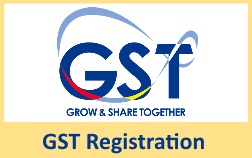Optimize Your Financial Savings with the most effective GST Registration Services in Singapore
Optimize Your Financial Savings with the most effective GST Registration Services in Singapore
Blog Article
From Beginning to Finish: The Ultimate Roadmap to GST Enrollment for Companies Looking For Financial Security
Navigating the intricacies of Item and Solutions Tax (GST) enrollment is a crucial step for businesses pursuing monetary security. From understanding the fundamental principles of GST to following post-registration standards, the procedure can appear daunting in the beginning glimpse. Nonetheless, damaging down the roadmap into manageable steps can improve the enrollment trip for organizations wanting to improve their economic standing. Allow's check out the essential components that comprise this best roadmap and discover how each stage contributes to laying a solid foundation for financial success.
Comprehending GST Essentials
Delving into the essential concepts of Item and Services Tax (GST) is crucial for acquiring a thorough understanding of its implications on companies and the economic situation. Input Tax Credit Scores (ITC) is a considerable attribute of GST, permitting businesses to claim credit report for tax obligations paid on inputs, reducing the overall tax concern. Comprehending the essentials of GST is critical for businesses to comply with tax policies, manage their financial resources effectively, and add to the nation's economic growth by taking part in a clear tax obligation system.
Eligibility Requirements for Enrollment
To sign up for GST, organizations should meet certain qualification requirements established by the government. The primary eligibility requirement is that any kind of organization entailed in the supply of items or solutions with a yearly aggregate turnover above the threshold restriction set by the authorities need to sign up for GST. Since the existing guidelines, the threshold restriction for GST registration is a yearly aggregate turn over of 40 lakhs for services operating within a state, with the exception of unique classification states where the limit is 20 lakhs. In addition, particular companies are required to sign up for GST irrespective of their turnover, such as interstate distributors, laid-back taxable individuals, and companies reliant pay tax under the reverse cost mechanism. It is important for services to extensively analyze their turnover and purchase kinds to determine their GST registration responsibilities properly. Failing to sign up for GST when eligible can result in penalties and lawful repercussions, making it vital for businesses to stick to the defined eligibility criteria.
Papers Required for Registration
Having satisfied the qualification criteria for GST registration, organizations should currently ensure they have the requisite files in position to continue with the enrollment process efficiently. The files required for GST enrollment generally include proof of service constitution, such as collaboration action, registration certificate, or unification certification for different sorts of businesses. Furthermore, businesses need to why not try this out offer papers developing the primary workplace, such as a rental agreement or electrical power expense. PAN card of business, along with the identification and address evidence of promoters/partners/directors, are essential for confirmation functions. Checking account statements, together with terminated cheques or a copy of the bank passbook, are required to confirm the financial details supplied throughout registration. Moreover, organizations have to have digital signatures all set for the accredited notary. Guaranteeing all these records are organized and readily offered will accelerate the GST registration procedure, allowing companies to follow tax policies perfectly.
Step-by-Step Registration Refine
Commencing the GST registration process entails a collection of structured steps to make certain a compliant and smooth enrollment for companies. The initial action is to visit the GST website and complete the enrollment form with accurate details of business entity. Following this, the candidate obtains a Short-term Recommendation Number (TRN) which is utilized to return to the application procedure if it's not finished in one go.
Following, all called for documents as per the checklist supplied by the GST portal need to be submitted. These files generally include evidence of business registration, address and identity evidence of marketers, monetary declarations, and service entity's frying pan card.

Post-Registration Compliance Standards

Conclusion
In conclusion, organizations looking for economic security should comprehend the basics of GST, meet qualification requirements, gather needed records, comply with the step-by-step enrollment process, and comply with post-registration guidelines - Best GST registration services in Singapore. By sticking to these actions, organizations can make certain conformity with tax regulations and keep monetary stability in the lengthy run
Furthermore, certain businesses are needed to register for GST regardless of their turnover, such as interstate suppliers, laid-back taxable individuals, and services liable to pay tax obligation under the reverse fee mechanism.Having actually satisfied the eligibility requirements for GST registration, businesses should now guarantee they have the requisite records in location to proceed with the registration procedure effectively. The files needed for GST registration generally consist of proof of company constitution, such as collaboration deed, enrollment certificate, or unification certificate for various kinds of organizations. In addition, companies require to offer papers establishing the primary area of business, such as a rental arrangement or electricity expense.Starting the GST enrollment process includes a collection of structured steps to make sure a smooth and compliant enrollment for businesses.
Report this page